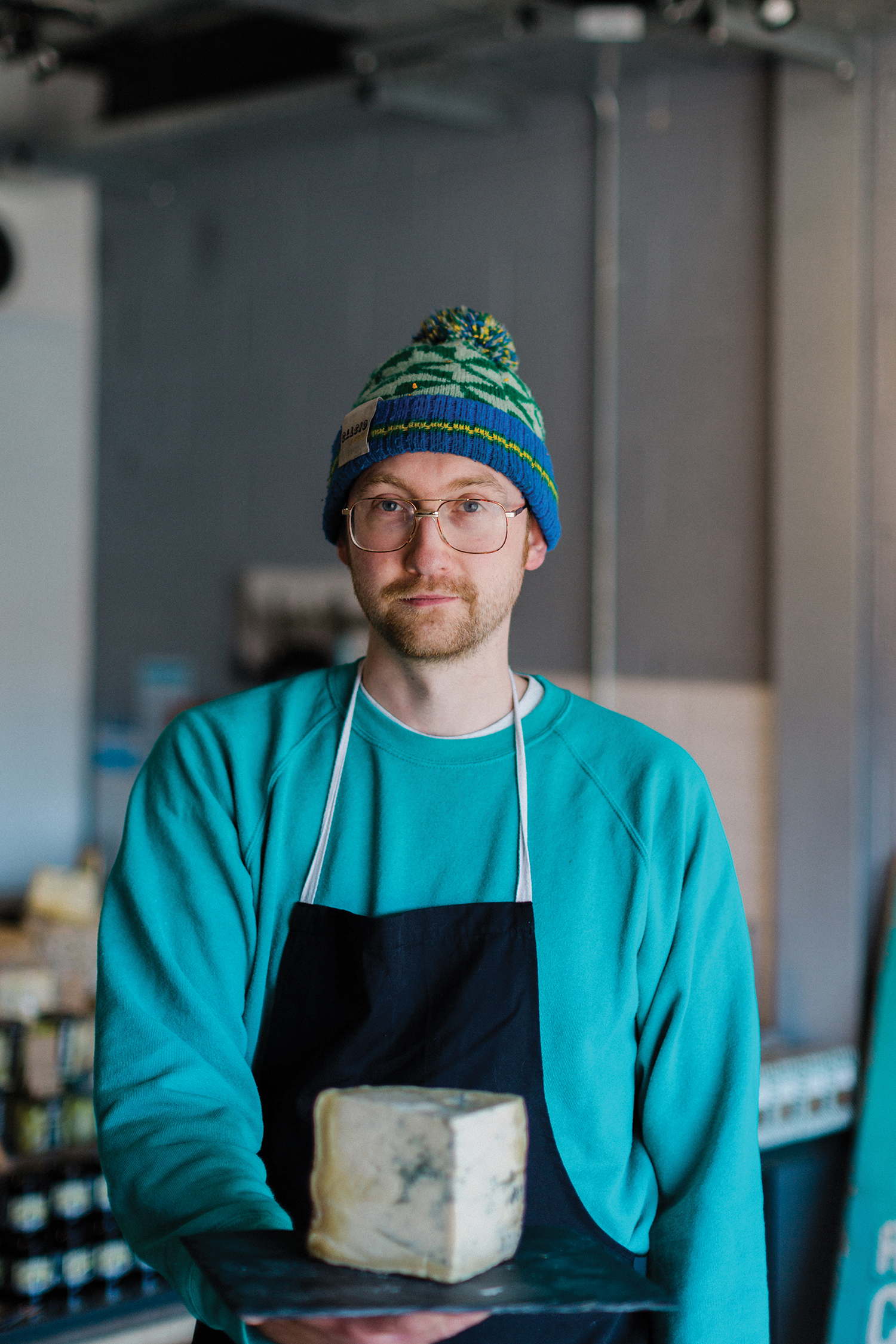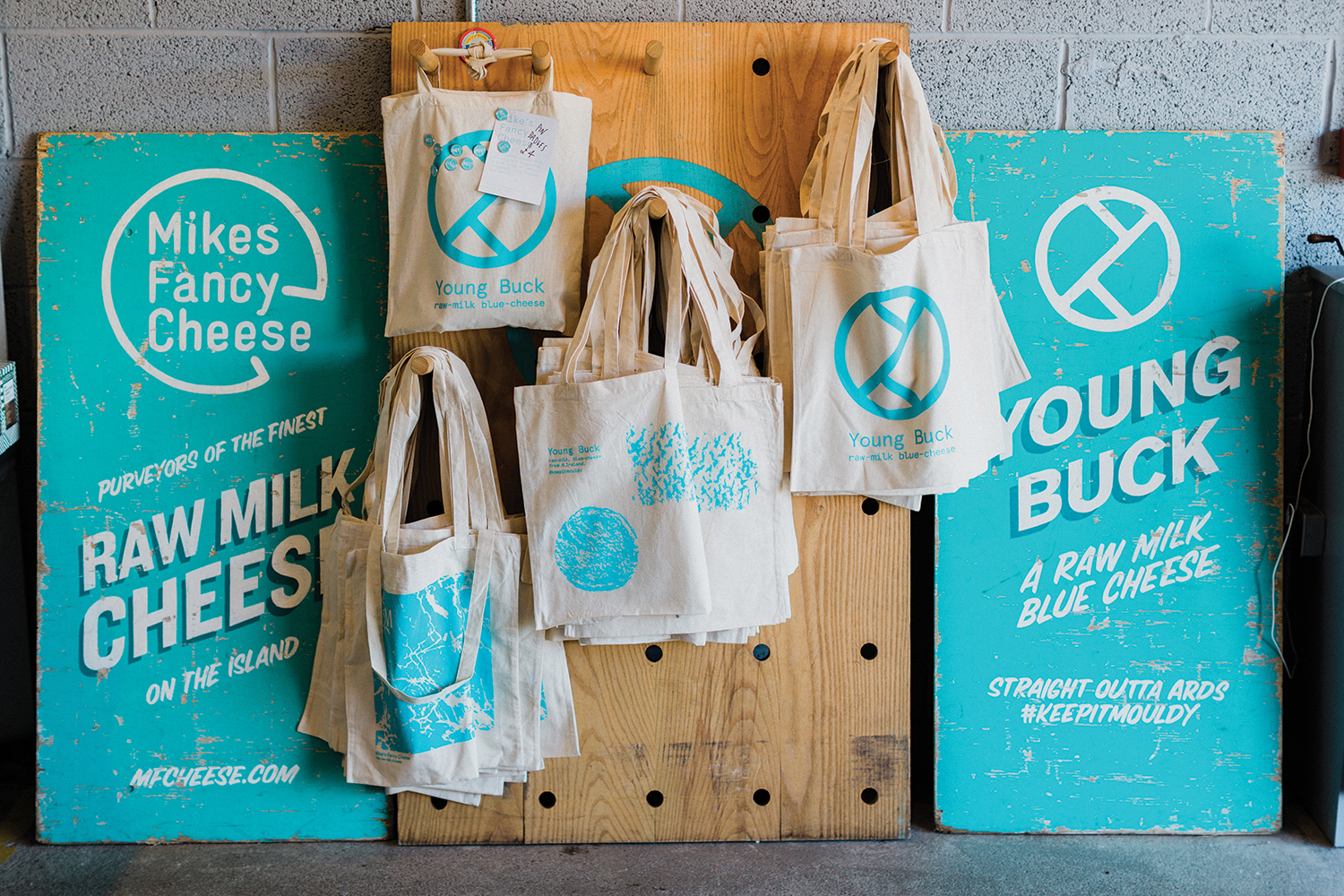
Mike Thomson grins at me from behind huge science-geek glasses as he holds out a nibble of blue-veined cheese for me to try. The annual May food fair thrown by Sheridans Cheesemongers just outside of Dublin is underway: Sheep have been nudged out of their pasture and replaced by striped tents, smells of grilled burgers and buttery escargot float through the air, and craft brewers sling beer into plastic cups to be carried over to a lawn where guitarists strum. Normally such an idyllic scene would be cause for a smile.
But Thomson has several reasons not to grin. Many parents immediately discourage their children from tasting his blue cheese. (“Here, let them try it,” he says, evenhandedly.) Fresh may be the latest culinary buzzword, but Thomson doesn’t play into the trend—his sign says, “Keep It Mouldy,” an homage to the not-so-fresh-smelling cheeses he produces at Mike’s Fancy Cheese. Seemingly another strike against him: Everyone here is Irish, yet as a Northern Ireland native, Thomson is actually a citizen of the United Kingdom. Already indebted to 100 investors, the 33-year-old now has Brexit hanging over his head, too.

Mike Thomson of Mike’s Fancy Cheese
The particulars of Great Britain leaving the European Union have been debated for more than three years, still without full resolution. In Northern Ireland, two decades after the Troubles, the fragile peace of an open-bordered land is at stake. For four decades—from 1968 to1998—recurrent bombings and other deadly violence reflected the tension between Catholics and Protestants in the country. Today, the border between Northern Ireland and the Republic of Ireland is unmanned, and residents of the North—while officially British citizens—can choose to hold a British or Irish passport. (Thomson’s is Irish.)
For Thomson, his tenuous start-up livelihood is also threatened. Business-crushing tariffs could easily be added to his cheese if it’s considered a UK export to the Republic of Ireland or continental Europe (70 percent of his cheese is currently exported to one place or the other). Once he’s saturated Northern Ireland’s small market, it will likely become increasingly difficult to grow and pay back his loans. “There’s no one advocating for Northern Ireland and its agriculture at the negotiating table,” says an Irish politician who wishes to remain anonymous. But Thomson still has hope he can succeed. “We’re a small enough business,” he says. “I think we can get by.”
Kevin Sheridan, co-founder of Sheridans Cheesemongers, calls Thomson one of the most promising young cheesemaker she’s seen lately. I bite into the morsel Thomson handed me. The cheese is a bit like Stilton but brighter, with some citrus amidst the usual dairy-barn tang. Thomson calls it Young Buck. If staying in business depended purely on the quality of this cheese, there would be no question of survival. Unfortunately for Thomson, the longevity of Mike’s Fancy Cheese is a bit more complicated.

Getting Started
Thomson discovered the world of artisan cheese as a teenager working behind the counter at Belfast’s Arcadia Deli. He’d always enjoyed cheese, but meeting the people who actually made it fascinated him. When he came across a cheesemaking course at England’s School of Artisan Food a few years later, he was ready to try his hand.
During the program, students planned to visit the Marcel Petite Comté caves in eastern France. Just before they were about to depart, Thomson discovered he’d lost his passport—he couldn’t leave the country. Instead, he traveled to Hampshire Cheeses, and later, to Sparkenhoe Farm in Warwickshire, U.K., to learn the art of Red Leicester–making. And he excelled. After completing the course, he became head cheesemaker of Sparkenhoe’s Red Leicester. Thomson describes the experience fondly: “Happy days, happy days.”
The plan was to eventually return to Northern Ireland, where, according to his research, no one had produced raw-milk cheese in 50 years. Thomson presented his experience, business plan, and letters of recommendation to four banks, but still none of them would lend him money. He was 26 years old and had no collateral.
 Thomson turned instead to a brand-new European crowdfunding platform, Seedrs. As money came in, he quickly learned to use the royal “we” in describing his business goals, even though he was a one-man band. A Sparkenhoe colleague donated nearly 15 thousand dollars. His mother’s extensive Irish-Catholic family pulled together the same. Within a month, he had more than 100 thousand dollars in hand from around 100 investors. By 2013, he was ready to start making cheese.
Thomson turned instead to a brand-new European crowdfunding platform, Seedrs. As money came in, he quickly learned to use the royal “we” in describing his business goals, even though he was a one-man band. A Sparkenhoe colleague donated nearly 15 thousand dollars. His mother’s extensive Irish-Catholic family pulled together the same. Within a month, he had more than 100 thousand dollars in hand from around 100 investors. By 2013, he was ready to start making cheese.
Thomson began with a circa-1919 Stilton recipe and experimented from there. He still does every step by hand, including ladling and draining the curds and piercing each wheel 250 times with a metal skewer to ensure the even distribution of blue mold. The resulting cheese has its own character, its texture softer and moister than a traditional Stilton, with a well-developed mushroomy rind, light blueing, and that bright citrus tang.
Young Buck tends to make believers out of even the biggest blue cheese haters. “It created an immediate shift in my attitude towards blue cheese,” wrote diner Mark Jordan in an online review. Jordan had almost asked Belfast’s Michelin-starred Eipic restaurant to leave it off a cheese board last year, since he’d never liked blue cheese. Then he tasted Young Buck and noted it was “quite possibly the nicest cheese I [had] ever tasted in my 57 years of being a foodie.”

Making a Go of It
To create a great product is one thing; to advertise it properly is quite another. Thomson isn’t afraid to show industrial imagery in his marketing. His Instagram feed feels urban and modern: delivery vans, graffitied walls, blue hairnets, and metal vats, with nary a cow in sight. “What pisses me off is any company that markets itself as rolling fields,” he says. “If you’re starting a modern business, it’s going to have certain hygiene standards. We played on that as a positive.”
Kevin Sheridan took notice of Thomson’s fresh approach and raw, beyond-rural imagery. “You tend to see pictures of cottages, old stools, maybe a campfire [in cheese marketing]. But modern cheesemakers can use great design and technology. We can [respect] the good old things, and then move forward.”
Thomson invites me to visit his production facility in Newtownards, a slightly gritty area outside Belfast. I meet him at what appears to be a modest self-storage complex. A baker, a yogurt maker, a tech repair company, and a few gyms occupy nearby garages. Clad in a blue hairnet and rubber boots, Thomson leads me through the small room where the curds are produced, which is suffused with the scents of yeast and booze. We head to where the wheels are aged, a space that practically pierces our noses with ammonia.

Cutting the curd for Young Buck
While he primarily sells at farmers’ markets and to restaurants, buyers are also welcome to visit his cheesemaking facilities. “This is our own <i>Breaking Bad</i> garage,” Thomson jokes when three customers who’d recently met him at a cheese show pop in. “That’s the authenticity,” one says as she makes her way through his office where the desk consists of a strip of plywood on top of two sawhorses, complete with Thomson’s laptop.
The buyer stocks up on wheels that Thomson pulls from a picnic cooler. “Bang on, me boy, bang on,” she says as she leaves.
And so Thomson keeps at it, hoping to increase cheese production from 15 to 20 tons per year. He’s also branching out—in December 2018 he opened a Mike’s Fancy Cheese retail shop in Belfast. The new space, across from a barbed-wire-topped parking lot, has the urban, industrial feel he loves. It hosts workshops on of-the-moment culinary skills like fermenting butter and making kimchi, and though it’s off the beaten path, foodie tour groups stop by regularly.

Thomson sees plenty of benefits to the shop—he’s especially hoping to inspire more cheesemaking in Northern Ireland. But it’s also part of his contingency plan in case tariffs get slapped on his cheese exports. His girlfriend, Raymona Crozier, is a politics producer at the BBC, and she keeps him informed of every twist and turn in the negotiations. But he’s trying to be ready in any case. “The more cheese we sell direct, the bigger the cushion,” he says. “That’s been our Brexit plan: to sell more cheese to the public in Belfast.”
The risks of Brexit flare all around, and they could still incinerate his business—or block any future exporting and growth—with one harsh regulation or bureaucratic oversight. How does it feel to be Mike Thomson, a young buck? “Oh, terrifying, yeah yeah yeah!” he says. And then he laughs.
Photographed by Joe Laverty.




